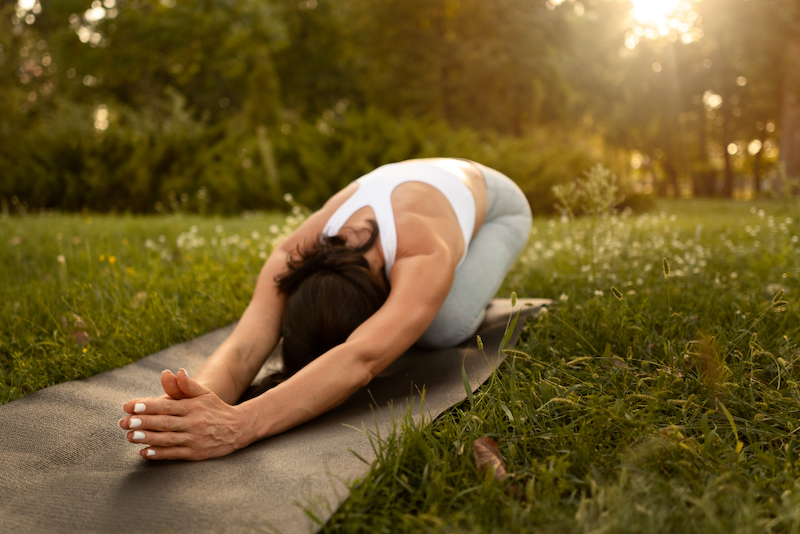Branded Content by Cosmic Press
Image: Freepik
Navigating college life can feel like running an emotional marathon. With rising pressures, overwhelming lifestyle changes, and the challenges of a sedentary life, it is only natural for students to frequently find their mental well-being on the line.
For many, anxiety often becomes a constant companion, overshadowing the college experience and causing a lasting scar on a person’s emotional wellbeing.
But, if you are feeling exactly like this, rest assured that there’s a straightforward path to reduced stress and more balanced emotional health: yoga. This guide introduces yoga not just as exercise, but as a tool for enhancing overall well-being.
Here’s all you need to know.
Yoga: A Low-Barrier Form of Exercise Making Movement Accessible By All
Yoga stands out as a highly accessible discipline with extremely low entry barriers. It can also be adapted to anyone’s personal needs, lifestyle requirements, and physical limitations.
Getting started and continuing the practice is simple and does not require any significant investment, which makes movement and mental health within the reach of any busy student.
Here are some of the ways in which yoga is accessible:
- Virtual courses. Choosing an online yoga class offers guidance at your convenience, making it easy to start or end your day with a session.
- No equipment necessary. Yoga requires nothing more than a small space and your body. You can make practice more comfortable by investing in a mat and yoga blocks, but these aren’t necessary.
- Can be practiced anywhere. Whether it’s a park, your dorm room, or a quiet corner in the library, you can practice your favorite asana and enjoy the benefits of yoga.
- Flexible duration of sessions. Yoga can be practiced anytime you feel like it. Even short periods, like study breaks, are beneficial.
Reduces Stress and Anxiety Levels
A Gallup poll reveals concerning statistics about student well-being: on an average day, 66% of students experience stress, 51% are affected by worry, and 39% struggle with feelings of loneliness. These numbers highlight the importance of finding strategies for managing stress!
That’s where yoga can help. This discipline teaches breathing techniques and mindfulness, which can significantly lower stress and anxiety levels.
By incorporating yoga into your routines, you can be better equipped to deal with everyday challenges and become more self-aware, which can prevent feelings of overwhelm and anxiety.
Promotes Better Sleep Quality
Far from being just a luxury, sleep is the cornerstone of health and well-being, acting as a fundamental process for mental and physical recovery. Medical research highlights the importance of quality sleep for cognitive function, emotional balance, and an overall sense of wellbeing.
Yoga, by promoting relaxation and stress reduction, emerges as a powerful ally in enhancing sleep quality. Practices like Yin and Restorative yoga encourage the body to enter a state of deep relaxation, making it easier to fall and stay asleep.
So, consider integrating yoga into your evening or bedtime routine to enjoy greater sleep quality.
Enhances Focus and Cognitive Function
In a world dominated by screens and instantaneous notifications, maintaining focus and cognitive function becomes a daily challenge, especially for students. Hours spent scrolling through social media or responding to messages can fragment attention spans and impair learning efficiency.
Yoga can counteract these distractions, promoting enhanced concentration and mental clarity. Through focused breathing and mindfulness exercises, yoga trains the brain to sustain attention, improving cognitive functions – which are, of course, critical for academic success.
Builds Physical Strength and Flexibility
For students, physical strength and flexibility are more than just fitness goals – they’re essential skills for maintaining overall health.
Regular yoga practice can be seen as an “all in one” discipline that tackles all muscle groups in the body, as well as their interconnectedness. This not only improves posture and body alignment but also reduces the risk of injuries, making daily activities and academic responsibilities easier to manage.
Getting Started: Finding Guidance With Yoga Courses
If you are new to yoga, signing up for a course can help. Working with a trainer will help you understand the principles of yoga, avoid injuries, and perfect your form. Whether online or in-person, these structured paths can offer personalized guidance, ensuring your practice aligns with personal goals and wellbeing.
Branded content furnished by our promotional partners. The Daily Sundial editorial staff is not involved in its production. Content does not reflect the views or opinions of the editorial staff.








